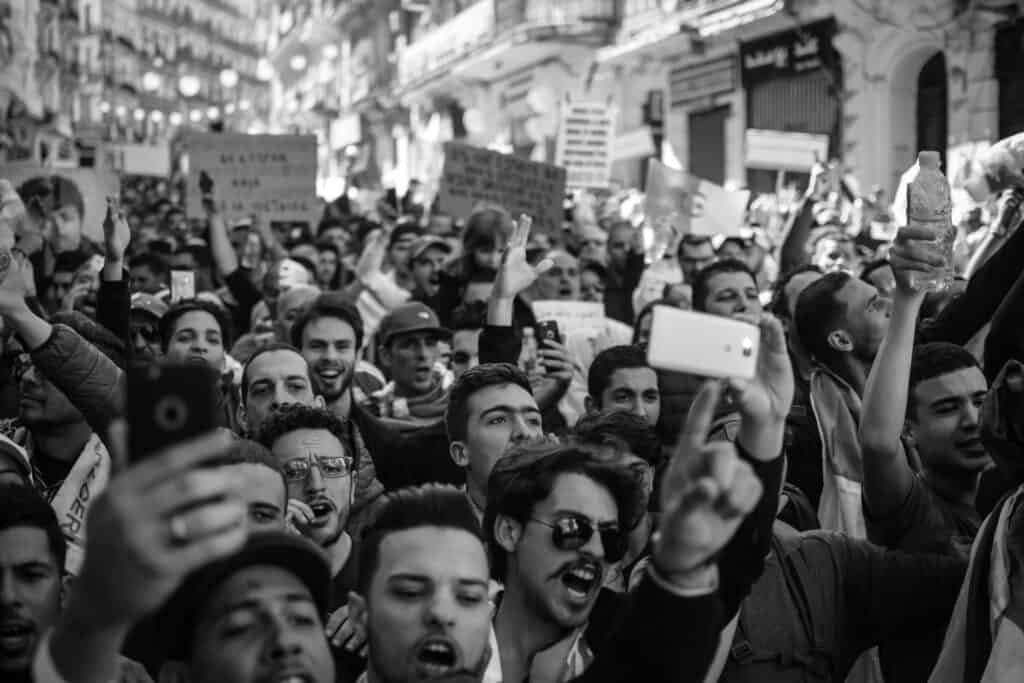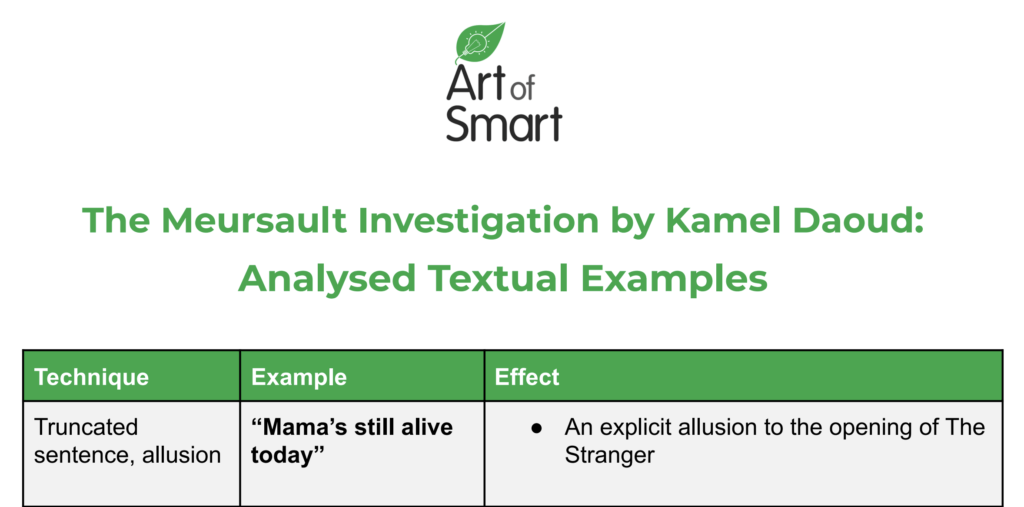
You’ve clicked on the right article! We’ll walk you through a step by step guide to analyse the text, including the plot summary, context, key ideas, and themes.
PLUS we’ll provide you with a free sample analysis table (also called a TEE Table) and a sample paragraph that you can download!
Let’s get started!
The Meursault Investigation by Kamel Daoud Summary
Key Characters in The Meursault Investigation
Context
Themes Explored in The Meursault Investigation
Studying The Meursault Investigation for HSC
Essay Analysis of The Meursault Investigation
The Meursault Investigation by Kamel Daoud Summary
Set in post-Independence Algeria, The Meursault Investigation is a retelling of The Stranger. It is a stream-of-consciousness novel narrated from the point of view of Harun, whose older brother, Musa, was murdered by Meursault in 1940s French-Algeria.
Harun narrates his experiences and stories to a young interlocutor he met at a bar in Oran. He recounts how he grew up with Musa and Mama in a poor neighbourhood.
His father left the family years earlier, and as a result Harun looked up to Musa as a father figure. One day, he hears that Musa has been killed by Meursault, the French protagonist in The Stranger.
Also studying The Stranger by Albert Camus? Check out our guide to analysing The Stranger here!
Unable to cope with the grief, Mama dedicates her time to investigate his death and discover more about why he was murdered.
A few months after his death, Mama and Harun leave Algiers in an effort to move on from the tragedy.
Harun recounts how as he grew older, Mama increasingly saw him as a replacement or ‘reincarnation’ of Musa.
As a teenager, he is also forced to help Mama continue investigating Musa’s murder. He quickly learns French, the language of the colonisers, and translates old newspaper clippings and stories of Musa’s death.
He knows the news stories will only worsen Mama’s grief so he creates his own stories, which present Musa as a martyr in the Algerian War of Liberation.
While telling his story, Harun confesses a secret to the interlocutor. During the Algerian rebellion against French colonialism, a Frenchman escaped a conflict in the street by hiding in the courtyard of Harun and Mama’s house.
They are woken up by the sound and Harun shoots the Frenchman twice. With the killing of the Frenchman, Mama considers that Musa’s death has been avenged.
Following the murder, Harun is arrested by the Algerian army not for killing the Frenchman, but for killing him after the ‘official’ War of Liberation.
An officer tells him that had Harun killed the Frenchman a week earlier, it would have been acceptable as a part of the war. The officer releases Harun following their conversation with no charges laid, which leaves Harun disappointed as he wanted to be sentenced for the murder.
As he narrates his story, Harun describes particular experiences and circumstances repeatedly, and apologises to the interlocutor for his scattered and out of order storytelling.
He continues his story and circles back to a woman he loved who he mentioned earlier in the story, Meriem.
He recalls how he first met Meriem when she arrived at their house to talk to Musa’s family and conduct research on Meursault’s novel. It was through Meriem that Harun and Mama realised that Meursault had written a book recounting Musa’s death.
The first time he read this book, Harun found himself feeling insulted by Meursault’s marginalisation of Musa as an unnamed Arab, but simultaneously captivated by his beautiful writing.
Harun concludes his monologue and asks the interlocutor to forgive his rambling storytelling and his age. He reflects on his status as an outsider in his community and describes how he lives like a ghost in his neighbourhood.
Contemplating on religion, Harun reasserts his rejection of religious dogma and recalls getting into a fight with an imam who tried to convert him.
Like Meursault, he screams and shouts about the meaninglessness of his condition. He too, wishes to be executed with his neighbours watching as spectators.
Key Characters in The Meursault Investigation
Harun
Harun, the novel’s protagonist and narrator, is an old Algerian man. Born in French-colonial Algeria, his childhood and early life is largely defined by the political and cultural situation of 20th century Algeria.
He is particularly traumatised by the murder of his older brother Musa, and continues to obsess over the circumstances of his death.
Harun’s narration is an angry stream-of-consciousness voice that strongly criticises Meursault, the protagonist of The Stranger, and the broader impacts of French colonialism.
He especially focuses on how Albert Camus’ novel does not give Musa a name, instead referring to him as ‘the Arab’.
However, while Harun passionately hates Meursault, there are strong parallels between both characters. Like Meursault, Harun rejects social assumptions, critiques religious dogma, and embraces the absurdity and meaninglessness of life.
Mama
Mama is Harun and Musa’s mother.
After her husband left the family, she grew very attached to Musa and became financially and emotionally dependent on him. As a result, she was deeply traumatised by his death and never fully recovered from it.
Since Musa’s body was never returned to her, she became obsessed with uncovering more information regarding his death and wanted to seek justice for the murder.
After Musa’s death, she began to see Harun as a sort of ‘reincarnation’ or replacement for Musa. Harun grows to resent her and blames her for his tumultuous early life.
Musa
Musa, Harun’s older brother, was killed by Meursault when Harun was 7 years old.
Prior to his death, Musa supported his family and acted as a father figure for Harun after their father abandoned them.
Meursault, after killing Musa, writes a novel that describes the murder as part of his larger philosophical struggle. In this book, Musa remains unnamed and is referred to as ‘the Arab’ (like Camus does in The Stranger).
In The Meursault Investigation, Harun gives Musa a name and an identity but he still remains vague.
Through this, Musa becomes a representative of the Arab identity and his death becomes a metaphor for the impacts of French colonialism in Algeria.
Interlocutor
The interlocutor is a young student who wants to hear about Musa from Harun’s perspective.
They meet at a bar in Oran over the course of multiple nights and Harun tells his story.
Kamel Daoud gives little information about the interlocutor to make the character vague and ambiguous. By doing so, the character represents the reader, which allows Harun to narrate directly to us.
Context
Kamel Daoud was born to an Algerian Muslim family and grew up speaking Arabic. He later studied French literature at the University of Oran.
Daoud wrote The Meursault Investigation from a postcolonial perspective that criticises colonialism and the marginalisation of the Arab population.
Post-Colonialism in Algeria
The text is set in post-Independence Algeria but most of the story follows Harun’s life during the colonial period and the War of Liberation.
Following the French invasion of Algeria in 1830, French rule over the next 132 years was characterised by violence, racism, and very limited economic and political autonomy for the indigenous Arab population.
Algeria’s growing discontent with French colonialism led to the beginning of The Algerian War, which took place between 1954 and 1962. During this war, the Algerian National Liberation Front (FLN) used guerrilla tactics against the French military and soldiers.
The French army, in retaliation, used violence, torture, and repression. Both sides contributed to the violence, deaths and tragedy of the war.
Eventually, Algeria gained independence from France in 1962, but political, religious and social conflicts continued between various Algerian rebel groups and factions.
Harun’s character in The Meursault Investigation experienced such violent and traumatic events, and was significantly shaped by this period of Algerian history.
Themes Explored in The Meursault Investigation
Here are some of the key themes explored in The Meursault Investigation:
- Postcolonialism
- Political and cultural impacts of colonialism
- Absurdism and existentialism
- The power of storytelling
Studying The Meursault Investigation for HSC Module A: Textual Conversations
If you’re studying The Meursault Investigation for the HSC, you’ll be studying it as part of Module A, which means you need to study it alongside The Stranger.
Since Module A is all about Textual Conversations, you need to consider the connections between both texts in order to strengthen your analysis.
Focusing on just the one text throughout your analysis means you’re missing an opportunity to highlight “resonances and dissonances” between texts, and to explore how texts can “mirror, align, or collide” each other.
Link #1: Common Issues, Values, and Assumptions
This Module looks at how a ‘conversation’ can take place between two texts as they share similar values, themes and ideas.
When you are analysing the texts, think about what ideas and values from Albert Camus’ original text are mirrored by Kamel Daoud, and why. Harun is characterised as very similar to the character of Meursault.
Both characters share a similar approach to life, society, and religion. Through these parallels, Kamel Daoud expands upon key themes of absurdism, existentialism, and spirituality from The Stranger.
So as you study The Meursault Investigation, consider how some themes are carried forward from The Stranger and how these are resonant regardless of social, cultural, or political contexts.
Module A encourages you to think about how and why some ideas are so timeless.
Link #2: Disparate Issues, Values, and Assumptions
Another important thing to consider is how The Meursault Investigation reimagines The Stranger so that some key themes and ideas challenge and critique the original.
Kamel Daoud wrote The Meursault Investigation in 2013 within the context of Algeria after Independence.
This means he interpreted The Stranger from his postcolonial point of view and as a result, the text challenges Albert Camus’ colonial ideas and uses this to criticise the long-lasting impacts of French colonialism.
Harun’s narration consistently argues that The Stranger did not give the Arab a name, which marginalised Musa’s identity and mitigated French colonial violence.
Tip: While analysing both texts, compare Harun’s anger and passionate hatred towards the colonial legacy of the French with the detached attitudes of Meursault.
Of course, this is just one of the major diverging values and ideas in The Meursault Investigation! As you study the Textual Conversations Module, make note of other disparate issues and think about how they link to broader ideas such as the author’s context.
Essay Analysis: How to Analyse The Meursault Investigation in 3 Steps
Once you’ve got a strong understanding of The Meursault Investigation and how to study it for Module A, it’s time to jump into your analysis!
This is a super important step that will help you build a solid foundation for writing a great essay and acing your HSC English assignment.
So make sure to spend a good amount of time analysing your text before you start writing your thesis!
Need a refresher on how to find and use quotes? Check out our guide here!
Step 1: Choose Your Example(s)
Choosing good examples from your text will give you the evidence you need to support your argument, which is why it’s the very first step when it comes to analysing texts!
For this analysis, we’re looking at how Kamel Daoud criticises French colonialism and highlights the value of narratives and storytelling to overcome absurdity and existentialism.
We’ve chosen the following quotes as an example:
“I’m going to do what was done in this country after Independence: I’m going to take the stones from the old houses the colonists left behind, remove them one by one, and build my own house, my own language”
“Do you find my story suitable? It’s all I can offer you… it’s your choice, my friend”.
Step 2: Identify Your Techniques
After you pick out the best examples to support your argument, the next step is to identify key techniques within that example.
Make sure to find techniques that add depth and complexity to your argument, not just a random technique! The key is to identify one or two relevant techniques that actually illustrate and support what you’re trying to say.
In this example, we’re focusing on metaphors and the second person perspective.
Need some help identifying techniques in The Meursault Investigation? Take a look at our literary techniques cheat sheet here!
Step 3: Carry Out Your Analysis
Once you’ve picked out your examples and techniques, it’s time to put it all together in your analysis!
Make sure your analysis really unpacks what the example is trying to communicate and the effect of the technique.
Flesh out your discussion by connecting your example to the text as a whole, including themes, context, and the author’s purpose. Your analysis should also stay relevant to your argument and thesis.
Don’t forget that the rubric always encourages you to “express a considered personal perspective”, so think about how you personally responded to the text and incorporate that in your analysis!
Once you’ve put it all together, you’ll end up with an analysis like this:
From the very first chapter, Harun uses the metaphor of construction and rebuilding as he states, “I’m going to do what was done in this country after Independence: I’m going to take the stones from the old houses the colonists left behind, remove them one by one, and build my own house, my own language”. The purpose of Daoud’s retelling thus, is very explicitly to achieve “the justice that comes when the scales are balanced”. Harun’s commentary here establishes political tensions within his postcolonial context by noting the injustices and immorality of French colonialism.
And, that’s a wrap!
Looking for another prescribed text for Module A?
- The Stranger
- All the Light We Cannot See
- Nineteen Eighty-Four
- Past the Shallows
- Wild Grapes by Kenneth Slessor
- The Crucible
- The Merchant of Venice
Check out other texts we’ve created guides for below:
- Romeo and Juliet
- Run Lola Run
- King Lear
- Jane Eyre
- In Cold Blood
- Persepolis
- To Kill a Mockingbird
- The Book Thief
- The Tempest
- Blade Runner
- Things Fall Apart
- Mrs Dalloway
Are you looking for some extra help with studying The Meursault Investigation for English?
We have an incredible team of English tutors and mentors!
We can help you master your analysis of The Meursault Investigation by taking you through a summary, its key characters and themes. We’ll also help you ace your upcoming English assessments with personalised lessons conducted one-on-one in your home or online!
We’ve supported over 8,000 students over the last 11 years, and on average our students score mark improvements of over 20%!
To find out more and get started with an inspirational English tutor and mentor, get in touch today or give us a ring on 1300 267 888!
Maitreyi Kulkarni is a Content Writer at Art of Smart Education and is currently studying a Bachelor of Media and Communications (Public Relations and Social Media) at Macquarie University. She loves writing just about anything from articles to poetry, and has also had one of her articles published with the ABC. When she’s not writing up a storm, she can be found reading, bingeing sitcoms, or playing the guitar.







